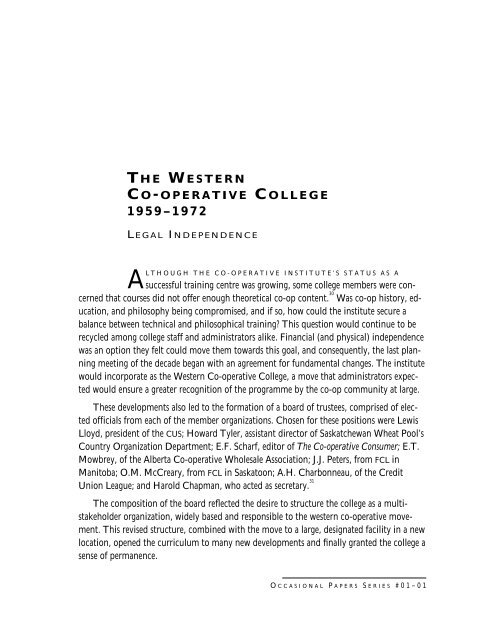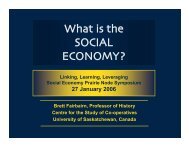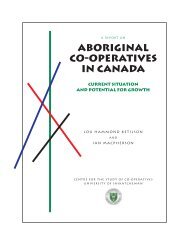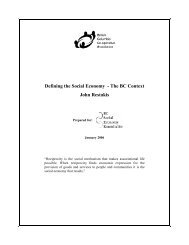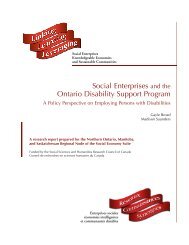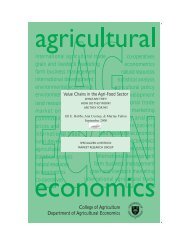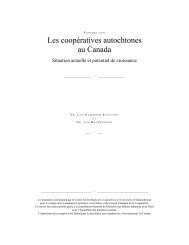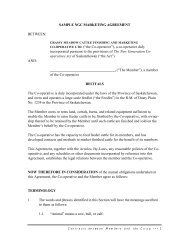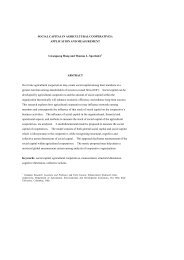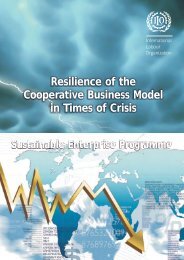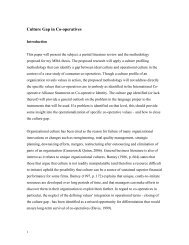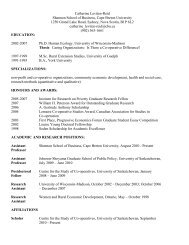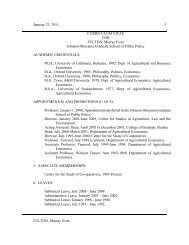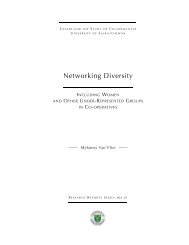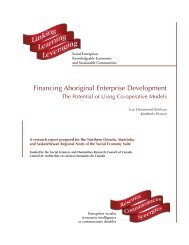Co-op College History - Centre for the Study of Co-operatives
Co-op College History - Centre for the Study of Co-operatives
Co-op College History - Centre for the Study of Co-operatives
You also want an ePaper? Increase the reach of your titles
YUMPU automatically turns print PDFs into web optimized ePapers that Google loves.
T HE W ESTERN<br />
C O-OPERATIVE C OLLEGE<br />
1959–1972<br />
L EGAL I NDEPENDENCE<br />
LTHOUGH THE CO-OPERATIVE INSTITUTE’S STATUS AS A<br />
A successful training centre was growing, some college members were concerned<br />
that courses did not <strong>of</strong>fer enough <strong>the</strong>oretical co-<strong>op</strong> content. 30 Was co-<strong>op</strong> history, education,<br />
and philos<strong>op</strong>hy being compromised, and if so, how could <strong>the</strong> institute secure a<br />
balance between technical and philos<strong>op</strong>hical training? This question would continue to be<br />
recycled among college staff and administrators alike. Financial (and physical) independence<br />
was an <strong>op</strong>tion <strong>the</strong>y felt could move <strong>the</strong>m towards this goal, and consequently, <strong>the</strong> last planning<br />
meeting <strong>of</strong> <strong>the</strong> decade began with an agreement <strong>for</strong> fundamental changes. The institute<br />
would incorporate as <strong>the</strong> Western <strong>Co</strong>-<strong>op</strong>erative <strong>Co</strong>llege, a move that administrators expected<br />
would ensure a greater recognition <strong>of</strong> <strong>the</strong> programme by <strong>the</strong> co-<strong>op</strong> community at large.<br />
These devel<strong>op</strong>ments also led to <strong>the</strong> <strong>for</strong>mation <strong>of</strong> a board <strong>of</strong> trustees, comprised <strong>of</strong> elected<br />
<strong>of</strong>ficials from each <strong>of</strong> <strong>the</strong> member organizations. Chosen <strong>for</strong> <strong>the</strong>se positions were Lewis<br />
Lloyd, president <strong>of</strong> <strong>the</strong> CUS; Howard Tyler, assistant director <strong>of</strong> Saskatchewan Wheat Pool’s<br />
<strong>Co</strong>untry Organization Department; E.F. Scharf, editor <strong>of</strong> The <strong>Co</strong>-<strong>op</strong>erative <strong>Co</strong>nsumer; E.T.<br />
Mowbrey, <strong>of</strong> <strong>the</strong> Alberta <strong>Co</strong>-<strong>op</strong>erative Wholesale Association; J.J. Peters, from FCL in<br />
Manitoba; O.M. McCreary, from FCL in Saskatoon; A.H. Charbonneau, <strong>of</strong> <strong>the</strong> Credit<br />
Union League; and Harold Chapman, who acted as secretary. 31<br />
The composition <strong>of</strong> <strong>the</strong> board reflected <strong>the</strong> desire to structure <strong>the</strong> college as a multistakeholder<br />
organization, widely based and responsible to <strong>the</strong> western co-<strong>op</strong>erative movement.<br />
This revised structure, combined with <strong>the</strong> move to a large, designated facility in a new<br />
location, <strong>op</strong>ened <strong>the</strong> curriculum to many new devel<strong>op</strong>ments and finally granted <strong>the</strong> college a<br />
sense <strong>of</strong> permanence.<br />
O CCASIONAL P APERS S ERIES #01–01


